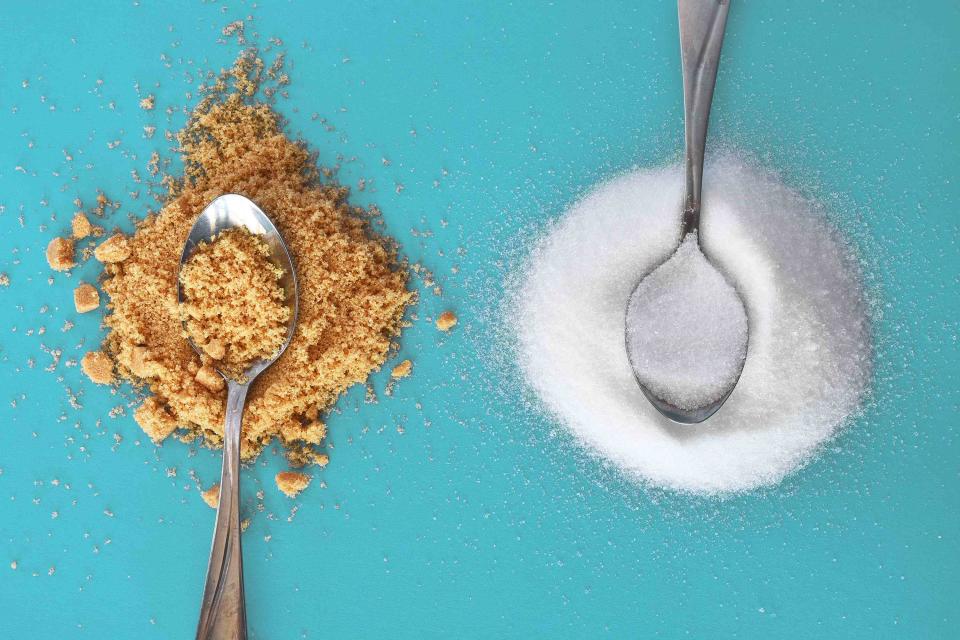Brown Sugar vs. White Sugar: What's the Difference?
It's about more than just a name and a color.

Pamwalker68/Getty Images
Sugar helps add sweetness to many recipes—or your morning cup of coffee. But all sugars are not the same, and brown sugar and white sugar have some key differences that could change the flavor, texture, and other aspects of how your recipes turn out.
So before you simply swap in white sugar vs. brown sugar in your recipes, learn about the differences between the two—and how your choice of sweetener could impact your final product.
Related: What Is Granulated Sugar—and Is It the Same Thing as Cane Sugar?
What's the Difference Between Brown Sugar Vs. White Sugar?
The difference between brown sugar and white sugar all comes down to how the sugar is made. Sugar in general comes from either sugar cane or (less commonly) sugar beets, and is refined by squeezing out the juice, heating and thickening it, then using a centrifuge to separate the liquid from the crystals.
The liquid goes on for further heating and thickening to become molasses, and the crystals are respun, dissolved in water, and filtered to remove impurities. It then goes through several additional filtration steps—including the addition of chemicals and filtration through bone char—to remove the color and become granulated sugar.
Brown sugar can be created in one of two ways. There are natural or unrefined brown sugars, where they are less processed to retain the color and moisture—think raw sugars or turbinado sugar. But generally, the dark or light brown sugar you find on store shelves is simply white granulated sugar which has different mounts of molasses added back into it.
Related: What Is Molasses? Everything You Need to Know About the Sugar Substitute
Is Brown Sugar Healthier Than White Sugar?
Nutritionally, brown sugar is basically on par with white sugar. They both have approximatethe same amount of calories (16) per teaspoon, and while brown sugar has some additional minerals—including magnesium, copper, and iron—the difference isn't enough to make brown sugar a clear favorite nutritionally.
Related: What Is the Healthiest Sugar Substitute?
Natural or raw brown sugars undergo fewer refining steps to filter and purify the sugar. Some vegans and other natural food advocates turn to less-processed varieties, such as turbinado sugar, to avoid sugar that's been processed with bone char.
How Using Brown Sugar Vs. White Sugar Impacts Your Baking and Other Recipes
Obviously, both brown sugar and white sugar will add sweetness to any recipe, but the notes of molasses add a deeper, richer flavor to the recipes that call for it. But each type of sugar adds a little something different to your baked goods on other fronts.
For instance, both types of sugar help create the texture of your baked goods by trapping moisture into the batter, so it stays moist. The molasses in brown sugar adds more moisture to the baked good, so it makes your finished product even softer than white sugar would.
Sugar helps make some baking recipes light and airy. Whipping it through butter or other fats creates air pockets that rise when baked, and whipping it into egg whites helps keep them more stable.
Sugar also gets caramelized when it's baked, so it gives your baked goods that nice, browned finish—which will be slightly more pronounced in a recipe that calls for brown sugar.
In non-baking recipes, such as sauces, marinades, juices, and syrups, using white sugar vs. brown sugar will mostly impact the taste and the color of the finished product. So you might miss out on that darker, more caramelized flavor note if you use white sugar vs. brown sugar in a barbecue sauce, or you'll end up with a darker look to your cocktail if you make a simple syrup using brown sugar instead of white sugar.
Can You Substitute White Sugar for Brown Sugar (and Vice Versa)?
Brown sugar and white sugar can be substituted for each other on a one-to-one ratio for many recipes—though obviously, it could impact the flavor and texture of your baked goods.
Related: 10 Smart Substitutes for Brown Sugar
If it's brown sugar you're missing, you're in luck. You can make your own brown sugar by adding one to two tablespoons of either molasses or another liquid sweetener (like honey, maple syrup, or agave) to a scant cup of white granulated sugar.
If you're out of granulated sugar and need to sub in brown sugar, you can remove a couple of tablespoons of another liquid ingredient (i.e. milk or cream) to help compensate for the additional moisture from the brown sugar.
For more Real Simple news, make sure to sign up for our newsletter!
Read the original article on Real Simple.

